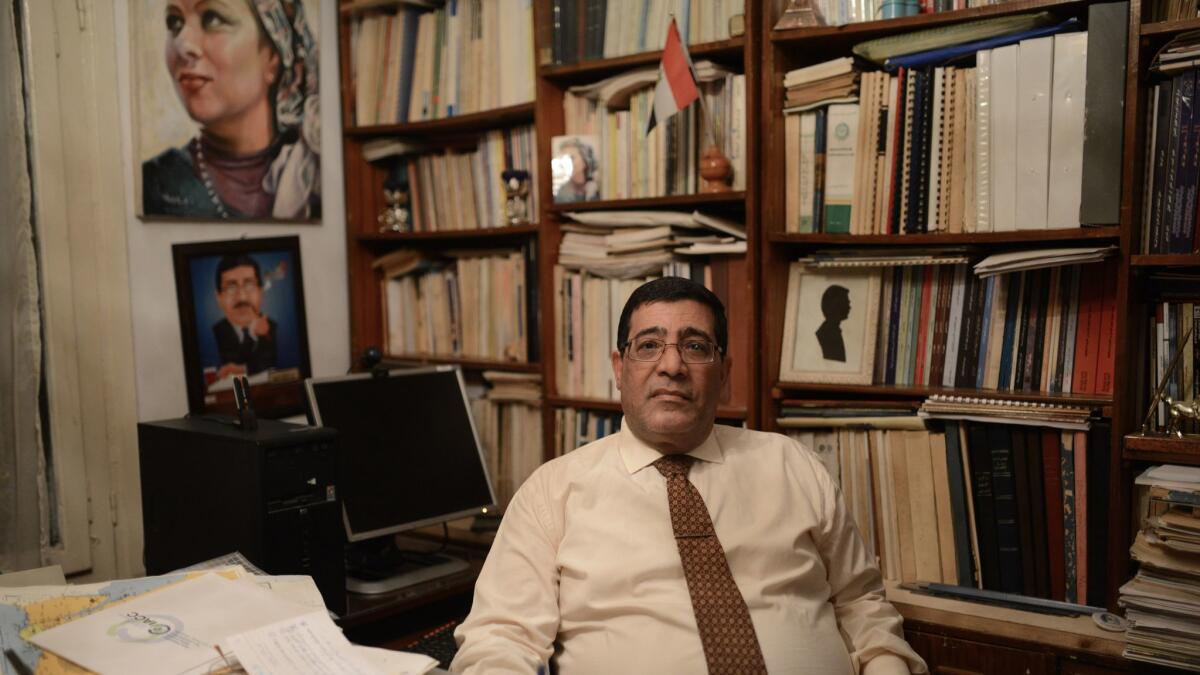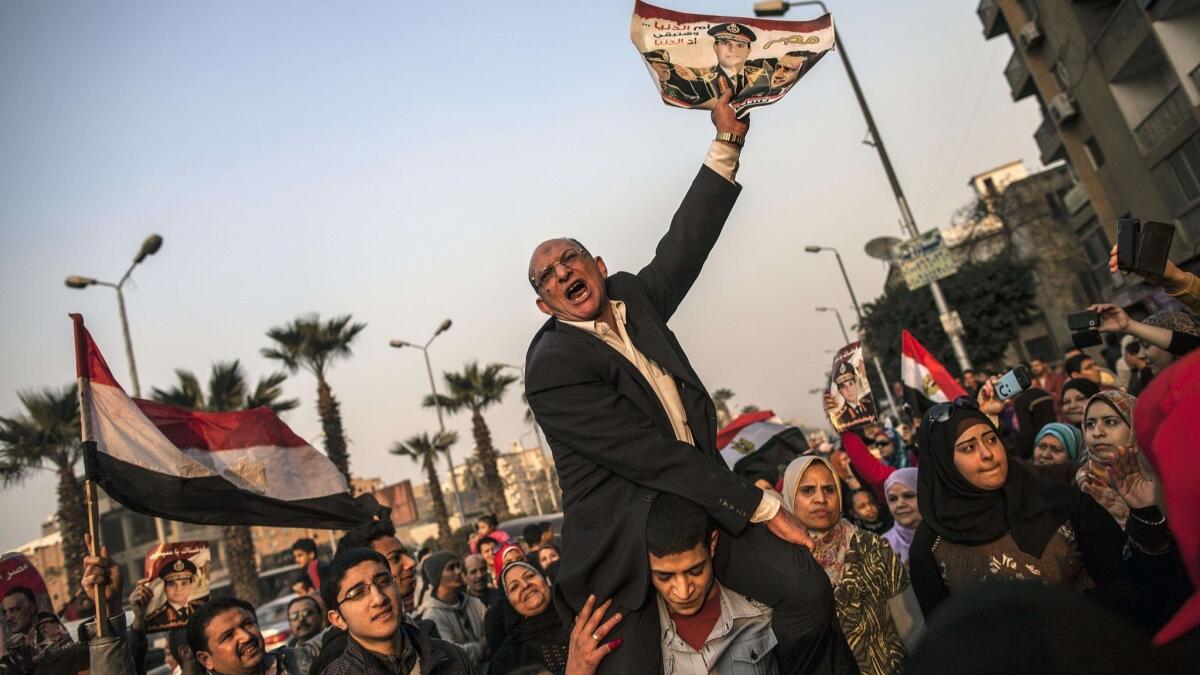In ‘fake news’ crackdown, Egypt is a world leader on jailing journalists, bloggers and social media users

- Share via
Reporting from Cairo — An award-winning economist whose work had been honored by the Egyptian government, Abdel Khalek Farouk was praised again and again for his writings and observations of his country’s economy, including a best-book citation at an event organized by President Abdel Fattah Sisi’s administration.
But the long list of accolades didn’t give Farouk much immunity when he wrote a book critical of Sisi’s economic policies.
In late October, seven police officers came to his home in Cairo’s affluent suburb of El Shorouk and took him away. Seven days earlier, his publisher Ibrahim Khateib had also been detained by authorities.
“They took me in a very decent way,” he said, explaining that the officers at least refrained from handcuffing him. Still, Farouk went with them fearing he’d likely languish in prison for several years while awaiting trial, the norm in Egypt. He was released after 10 days, pending an investigation.
His alleged crime? Spreading “fake news,” in Farouk’s case a book he wrote titled “Is Egypt Really a Poor Country?” The book argues that Egypt’s economic woes stem from the military’s grip on power since 1952 and that the country has squandered its ample wealth and resources.
Farouk is among scores of journalists, bloggers, social media users and others in Egypt who have been detained for “disseminating false information.”
From December 2017 to August of this year — a period when Sisi intensified his crackdown on perceived dissenters — there were 111 fake news cases in Egypt, according to Hussein Baoumi, Amnesty International’s chief researcher on Egypt. He said it marked a roughly 50% increase over the number of fake news cases the prior year.
In the last year, Egypt jailed more journalists on legally defined fake news charges than any country in the world, according to the Committee to Protect Journalists, which tracks freedom of the press around the world.
Of the 28 journalists jailed this year on fake news charges throughout the world, 19 were in Egypt, the group said. When all potential criminal charges are considered — not just fake news charges — Turkey jails more journalist than any other country, followed by China and Egypt.
In February, a reporter for HuffPost Arabi was detained after interviewing a campaign aide to Sami Anan, a presidential hopeful who had been arrested a month earlier as Sisi cleared the field of any serious rivals ahead of the elections. The aide was also detained after talking with the reporter and ultimately sentenced to five years in prison for spreading false information.
Egyptian TV host Khairi Ramadan, a popular television figure known as being pro-government, was arrested in March on suspicion of spreading fake news after a segment aired featuring a police officer’s wife complaining about low police salaries. Two journalists were detained in January while working on a story about the trams in Alexandria.
With the crackdown on the mainstream media in Egypt ongoing, the government this year started going after bloggers, activists and social media users.
In March, ahead of Sisi’s reelection bid, a hotline was established so that citizens could report anything they believed was fake news.
More than 500 websites have been blocked in Egypt since May 2017 and a cybercrime law went into effect in August, giving the government broad powers to block any website it regards as endangering national security or threatening the economy.
In July, Sisi said the proliferation of fake news had become such a problem in Egypt that in just three months his government identified 21,000 “rumors” that sought to undermine government stability. Sisi didn’t elaborate on what he meant by rumors, but it was widely interpreted as being a synonym for fake news.
And in August, the government ratified a law mandating that anyone with more than 5,000 followers on social media sites be classified as a media outlet, subjecting them to possible prosecution for spreading “fake news.” Oversight of the social media platforms was put under the authority of the newly created Supreme Council for the Administration of the Media.
Under Egyptian law, spreading false news is considered a crime under a number of government provisions, including the penal code, a counter-terrorism law and the new media laws, said Mai Sadany, legal and judicial director at the Tahrir Institute for Middle East Policy. Depending on the context, she said, punishments range from a fine to up to 15 years in jail.
The fake news charge is most often used in conjunction with more serious charges, such as terrorism, that carry lengthy prison terms.
Nearly eight years after the January 2011 revolution, “the level of media freedom is abysmal and Egypt is now one of the world’s biggest prisons for journalists,” said Reporters Without Borders, which advocates for free speech and monitors journalists around the world who have been jailed or detained.
The group puts Egypt near the bottom of its annual world press freedom report card, along with countries including Libya, Yemen, Iran and Saudi Arabia. North Korea is last on the list, a country so restrictive that people are essentially kept in ignorance, the group said.
Sisi’s government insists it is targeting only those who are attempting to destabilize the country at a time when Egypt is focused on reviving its flagging economy and fighting terrorism. The president acknowledged the economic suffering of Egyptians after austerity measures were implemented in return for a $12-billion loan from the International Monetary Fund, but said it’s no excuse for undermining the government.
Egypt has faced years of political and economic turbulence after street protests ended the nearly 30-year dictatorship of Hosni Mubarak in 2011. The next year, the country voted in its first democratically elected president, the Muslim Brotherhood’s Mohamed Morsi. But Morsi was ousted in 2013 in a military overthrow led by then-Gen. Sisi, who became president the following year.
Sensitivity to criticism has been a prominent feature of Sisi’s presidency since he came to power.
“Be warned,” he cautioned in January. “What happened seven or eight years ago will not happen again in Egypt,” referring to the “Arab Spring” protests.
During his tenure, tens of thousands have been imprisoned, protests and demonstrations have in effect been banned, and the clampdown on the mainstream media — and now social media — has steadily tightened.

The arrests this year included political activists Hazem Abdel-Azim and Shady Harb, both active social media users known for being critical of the government, and activist Amal Fathy, who was detained and sentenced to two years in jail after she posted a video on Facebook complaining about sexual harassment. A prominent blogger who campaigns against torture, Wael Abbas was recently released after seven months behind bars but only on the condition that he report to a police station every other day.
“What we’re seeing is both an increased reliance on the spreading false-news charge itself, as well as a widening of the types of targets against which the charge is being brought,” said Sadany, of the Tahrir Institute for Middle East Policy.
“The charge itself, which was likely conceived of in a narrow press-related sense when it was first written into the Egyptian penal code, is now being levied in many cases, is — in fact — one of the more common charges we are seeing and has extended well beyond journalists and bloggers to everyday social media users, political party organizers, human rights lawyers and even academics.”
That this is all happening as President Trump continues to cry “fake news” and calls the press “the true enemy of people” in the U.S. is no coincidence, Sadany said.
“President Trump’s use of the term ‘fake news’ has inspired autocrats around the world to themselves employ the language when making excuses for rights-constraining behavior,” Sadany said. “At a time in which use of the term ‘fake news’ has seemed to resonate with some everyday people here in the U.S., it is hard for Egypt to see that example and not follow suit.”
Despite his arrest, Farouk said he intended to continue writing and speaking out.
“I’m defending Egyptian citizens with figures that show that Egypt is a rich country, not a poor one like the president keeps saying.”
Islam is a special correspondent.
More to Read
Sign up for Essential California
The most important California stories and recommendations in your inbox every morning.
You may occasionally receive promotional content from the Los Angeles Times.










